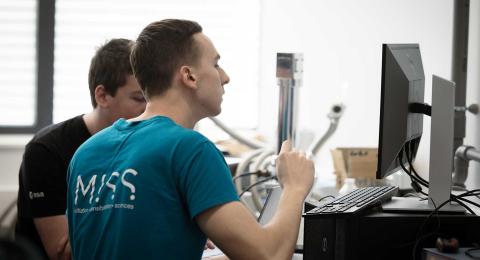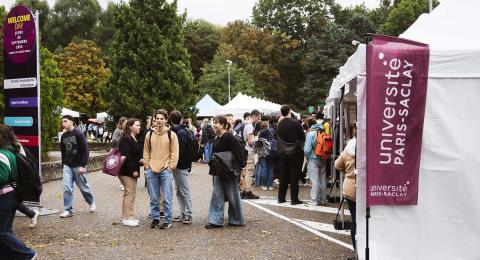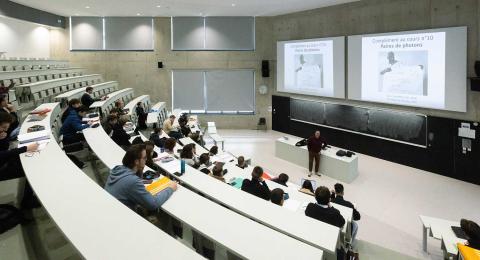The Master’s in Transition to Sustainability (M1) trains students in social sciences and environmental studies to actively support the ecological transition. Highly interdisciplinary, it addresses sustainable development, planetary boundaries, and environmental management, covering economics, sociology, anthropology, natural sciences, law, and research methodology. All courses are taught in French, requiring a strong command of the language.
This program builds on the research themes of the renowned laboratories at Université Paris-Saclay (notably CEARC on the UVSQ campus), both in the field of ecological economics and in interdisciplinary studies. Ecological economics and interdisciplinary studies are now recognized as the most promising fields for addressing collective-action challenges related to contemporary issues of inequality and environmental degradation, and for building a future in which these issues no longer arise.
Information
Skills
At the end of this program, graduates are able to analyze, evaluate, and support ecological transition processes in a variety of professional contexts. In this framework, they are capable of:
- mobilizing and producing highly specialized knowledge,
- contributing to transformation in professional contexts,
- developing solutions and recommendations that meet sustainable development objectives,
- analyzing sustainability challenges from multiple disciplines and across different spatial scales.
Objectives
The Master’s in Transition to Sustainability (M1) trains professionals to mobilize theoretical, methodological, and practical knowledge to understand and act on complex environmental, social, and economic challenges. All courses are taught in French, so a strong command of the language is required.
By the end of the year, students will be able to:
- Understand the history, political foundations, and evolution of sustainable development, analyze environmental, social, and economic conditions, and evaluate the diversity of theoretical and practical approaches to sustainability.
- Develop a multidisciplinary perspective on the interactions between biodiversity, food, agriculture, society, and the environment, and communicate and debate critically with both the public and professionals from diverse fields.
- Critically analyze economic systems, assess the impacts of human activities on ecosystems, and consider sustainable development pathways, including growth, alternative indicators to GDP, and ecosystem services.
- Master the fundamentals of environmental, ecological, and international political economy, development theories, and public policies, and use economic instruments to inform environmental policy choices.
- Rethink the links between human resources, corporate social responsibility (CSR), and sustainability, analyzing employment quality, well-being, inequalities, and the impacts of public policies and management practices.
- Study the role of mobility and transportation in sustainable territorial planning and propose strategies adapted to urban, rural, or regional contexts.
- Understand ecosystem functioning, biodiversity, biogeography, conservation biology, and human impacts, and analyze culture-environment interactions through anthropology and indigenous knowledge.
- Apply sociology to environmental issues and conduct field research on citizen, associative, or entrepreneurial initiatives.
- Design and carry out qualitative and quantitative field surveys, anticipate and manage difficulties, plan data collection, and limit bias.
- Grasp the systemic dimension of environmental risks and propose territorial risk management strategies (floods, droughts, fires, heatwaves, pandemics, etc.).
- Use participatory practices to integrate citizen participation into social, climatic, or health risk management.
- Develop an interdisciplinary approach to health and well-being, analyzing links between living environment, social justice, pollution, and territorial resilience.
- Master environmental law and its application (principles, actors, sanctions) and communicate in English on environmental sciences.
- Design and carry out a research project or internship, write a rigorous thesis or report, and develop autonomy, clear expression, and collaborative work skills.
Career Opportunities
Career prospects
Après Master + Doctorat : chercheur ou enseignant-chercheur
Bureaux d'études spécialisés dans l'évaluation des impacts environnementaux
Chargé de mission / Chargé d’études biodiversité, développement durable
Chargé de mission développement durable
Chargé de mission environnement
Chargé de mission environnement / biodiversité
Chargé de projet et de développement territorial
Chargé de projet et de développement territorial
Chargé d'études développement durable
Chargé d'études environnement
Chargé d’études technico-économiques, stratégiques, environnementales
Chargé·e de projet
Consultant en éthique des affaires et RSE
Responsable RSE
Further Study Opportunities
Master 2
Fees and scholarships
The amounts may vary depending on the programme and your personal circumstances.
Admission Route
Capacity
Available Places
Target Audience and Entry Requirements
The M1 in Transition to Sustainability is intended for students who have completed three years of higher education, with an overall average well above 12/20. Given the interdisciplinary nature of the program, degrees from all academic disciplines may be considered.
This Master’s combines action and research: a strong motivation for the challenges of sustainability transition and environmental management is therefore essential. Successful completion of the program requires full proficiency in French and good English skills, necessary for accessing readings and scientific publications.
Supporting documents
Compulsory supporting documents
Motivation letter.
All transcripts of the years / semesters validated since the high school diploma at the date of application.
Curriculum Vitae.
Additional supporting documents
VAP file (obligatory for all persons requesting a valuation of the assets to enter the diploma).
Supporting documents :
- Residence permit stating the country of residence of the first country
- Or receipt of request stating the country of first asylum
- Or document from the UNHCR granting refugee status
- Or receipt of refugee status request delivered in France
- Or residence permit stating the refugee status delivered in France
- Or document stating subsidiary protection in France or abroad
- Or document stating temporary protection in France or abroad.










